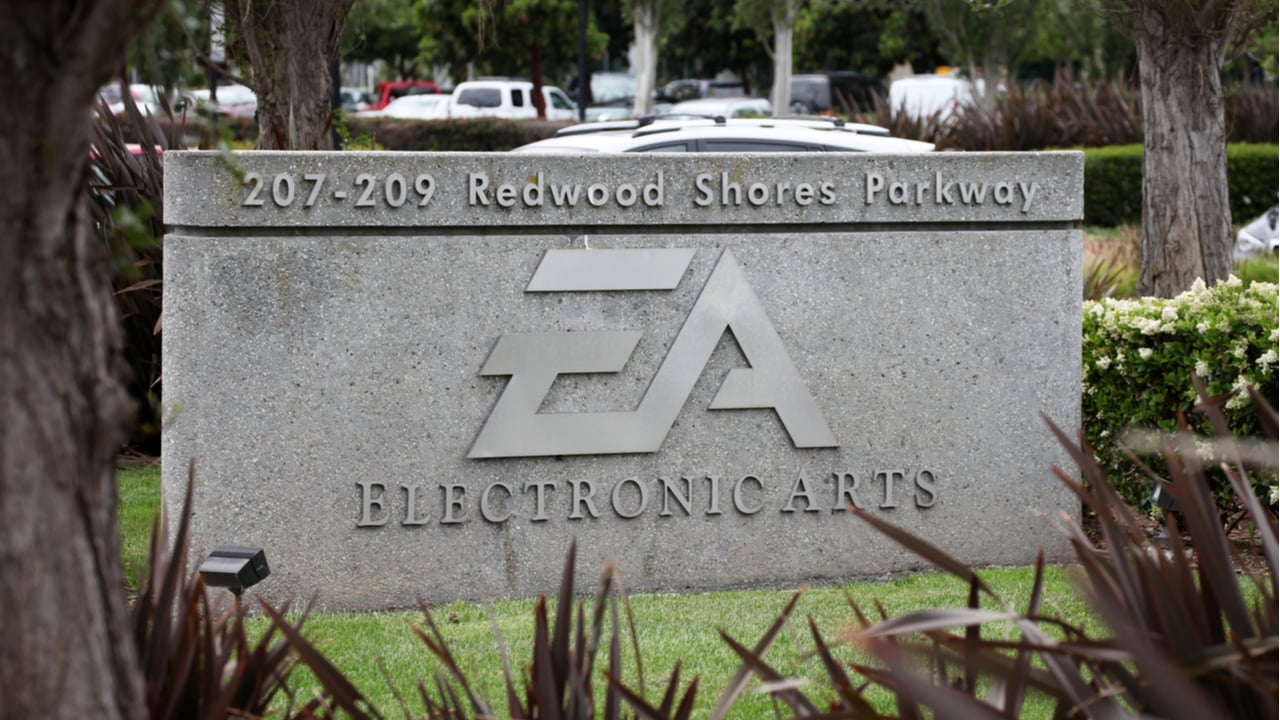 Most game developers in U.S. and U.K. are now using blockchain elements in their games, according to a study released this week. The study, commissioned by a company named Stratis, reveals that the popularity of blockchain, NFTs, and the new play-to-earn model in the crypto market is making game developers change the traditional ways in […]
Most game developers in U.S. and U.K. are now using blockchain elements in their games, according to a study released this week. The study, commissioned by a company named Stratis, reveals that the popularity of blockchain, NFTs, and the new play-to-earn model in the crypto market is making game developers change the traditional ways in […] Electronic Arts (EA), an important gaming and entertainment-oriented company, has made insightful remarks about the importance of NFTs and the play-to-earn model in its last earnings call. Andrew Wilson, CEO of the company, addressed the subject in response to several questions posed by business analysts. Electronic Arts Open to NFTs and Play-to-Earn Electronic Arts, the […]
Electronic Arts (EA), an important gaming and entertainment-oriented company, has made insightful remarks about the importance of NFTs and the play-to-earn model in its last earnings call. Andrew Wilson, CEO of the company, addressed the subject in response to several questions posed by business analysts. Electronic Arts Open to NFTs and Play-to-Earn Electronic Arts, the […]
In-game NFTs have generated $2.3 billion in sales over the past three months and Axies are the top sellers.
The number of crypto wallets participating in blockchain games has surged in recent months according to new research.
According to DappRadar’s Q3 ‘Blockchain Game Report’, unique active wallets connected to gaming decentralized applications reached a total of 754,000 for the period. This represents almost half of the industry’s activity with the blockchain industry registering 1.54 million daily unique active wallets on average over the three-month period.
The unique active wallet metric refers to unique addresses that interact with a given smart contract, so it does not necessarily translate to daily active users.
The increase in gaming activity has been largely driven by the play-to-earn movement and in-game nonfungible tokens. These in-game NFT collectibles generated $2.32 billion in sales during Q3, the research stated, adding that this represents 22% of the total NFT trading volume for the period:
“In the midst of all the euphoria around Ethereum collections like CryptoPunks and Bored Ape Yacht Club (BAYC), the role that NFT in-game items played, may be overlooked.”
Around $10.67 billion in trading volume was recorded for the NFT space from July to September, an increase of just over 700% from the previous quarter.
The Axie Infinity metaverse has been one of the major driving forces for blockchain gaming. Players collect and raise “Axies” which are virtual creatures that can be used in player-versus-environment (PvE) and player versus player (PvP) battles in the game.
Axie Infinity amassed $2.08 billion in trading volume in Q3 and has currently hit $2.55 billion in total volume. DappRadar reports that there have been more than 6.7 million sales to date, and the current 24-hour volume is $15.2 million.
NFT tracker CryptoSlam lists Axie Infinity as the top-selling collection by sales volume over the past 30 days with $504 million.
Related: The Metaverse, play-to-earn and the new economic model of gaming
In late September, Axie Infinity enabled staking for its native AXS token which adds an additional layer of passive income on top of Axie’s play-to-earn potential. The move ignited AXS trading and drove prices to an all-time high of $155 on Oct. 4. The token has gained 743% over the past three months.
Play-to-earn gaming societies such as Yield Guild Games, which raised $12.5 million in a 30-second IDO (initial DEX offering) in July, have also seen massive momentum in recent months.
The Guild has been actively adding play-to-earn games to its growing ecosystem recently including Thetan Arena, CyBall, Influence, Merit Circle, and Star Atlas so far this month alone.
 Blockchain-based games and NFT trading were the driving force behind dapp adoption during Q3, according to defi insight platform Dappradar. In its Dapp Industry Report: Q3 2021 Overview, Dappradar states that the importance of these new activities in the crypto industry rose dramatically, making the space more diversified and competitive in the process. Defi also […]
Blockchain-based games and NFT trading were the driving force behind dapp adoption during Q3, according to defi insight platform Dappradar. In its Dapp Industry Report: Q3 2021 Overview, Dappradar states that the importance of these new activities in the crypto industry rose dramatically, making the space more diversified and competitive in the process. Defi also […]
Play-to-earn is booming, with startups Crypto Gaming United and Zebedee closing funding rounds of $5 million and $11.5 million respectively.
Crypto Gaming United, a startup aiming to build a global community of nonfungible token (NFT)-focused play-to-earn gamers, hraised $5 million in an oversubscribed seed funding round.
A Sept. 8 announcement notes the round was led by famed Australian venture capitalist Mark Carnegie and Chrono.tech CEO Sergei Sergienko — with the pair having co-founded the crypto-focused asset manager MHC Digital Finance.
Australian investment managers Shaw and Partners and Blockchain Assets also participated in the round.
Crypto Gaming United was established in August of this year and has already attracted more than 1,500 members and has a waiting list of almost 40,000. The guild helps members play the popular NFT-based game Axie Infinity by offering scholarships where sponsors provide expensive in-game assets to players who can use them to generate revenue.
Despite its seed round being led by Australian investors, the guild predominantly comprises Filipino players, with users also hailing from Indonesia, South Africa, and India. With most guild members hailing from low-income economies, many players may not have the means to acquire the expensive digital assets needed to play Axie Infinity amid a surging crypto bull market.
Crypto Gaming United is not the only company offering Axie Infinity scholarships, with sponsorship programs typically taking a share of the profits earned by players.
Sergienko stated: “The opportunity for wealth creation in the NFT space is no longer limited to those with the means, such as sports celebrities. At Crypto Gaming United, we are overcoming the cost barrier required for admission to play, thereby allowing players to generate income through their gaming exploits.”
The gaming guild ambitiously hopes to amass a user base of more than 100,000 within the next 18 months.
Carnegie is not alone in believing the innovative play-to-earn titles built on NFTs will see the crypto sector capture an increasing share of the $200 billion annual online gaming industry.
On Sept. 7, Zebedee, raised $11.5 million in Series A funding to expand its gaming initiatives including enabling game developers to pay out rewards to players in the form of crypto assets.
Launched in 2019, Zebedee provides the platform and tools to enable Bitcoin to be used as in game rewards and micro-transactions via Lightning Network infrastructure. Simon Cowell, co-founder and CEO, was previously head of corporate development at Bitstamp, the world’s longest-standing Bitcoin exchange.
Zebedee’s round was led by Lakestar, and also featured participation from Initial Capital, New Form Capital, and numerous gaming angels.
Related article: Philippine regulator tells Axie Infinity players they must pay tax on income from game
Crypto-native gaming has already seen explosive growth this year, with Axie Infinity’s user base growing from 30,000 in April to more than one million last month.
Yield Guild Games, a Philippine play-to-earn gaming collective offering Axie sponsorships, also raised $12.5 million via an initial DEX offering (IDO) in just minutes during July.

The Philippine government is yet to determine whether Axie’s in-game NFTs should be classified as securities or currency.
Amid the enormous success of crypto-powered game Axie Infinity in the Philippines, the local Department of Finance has made clear that it wants a cut of profits generated by playing Axie and other play-to-earn games.
An August 23 report from Inquirer cites Philippine Finance Undersecretary Antonette Tionko as clarifying that any profits gleaned through play-to-earn games are subject to income tax.
“Cryptocurrency is an asset, so it’s already taxable in the Philippines [...] whoever earns currency from it, it’s income you should report it,” she said.
While the official asserted that that play-to-earn gains “are subject to income tax,” Tionko conceded that lawmakers are yet to classify whether Axie’s in-game NFTs or native tokens Smooth Love Potion (SLP) and Axie Infinity Shards (AXS) are deemed to be securities or currencies.
She added that the matter should be determined by the local central bank and Securities and Exchange Commission:
“Is it a security? Is it a currency? So those are the things that will help us define the rules on how it should be taxed. But regardless of how it is characterized, it’s taxable — subject to income tax.”
While both the SLP and AXS tokens are earned through playing Axie Infinity, SLP functions as an in-game currency while AXS is the governance token of the Axie community.
Play-to-earn gaming exploded in popularity across the Philippines amid the pandemic, with the surging price of crypto assets meaning that locals could generate a decent income comparable to local wages by playing Axie Infinity.
Tionko also highlighted that Sky Mavis, the Vietnamese game studio that developed Axie Infinity, is not registered with the Philippine Bureau of Revenue despite generating income from sources based within the Philippines.
“That is one of the things that we hopefully capture once we have that system of registration for non-residents, those types of companies not in the Philippines."
The news sparked selling in the SLP markets, with the token crashing by as much as 15% on Aug. 24 before closing the day at a nearly 7% draw-down.
Related: Axie Infinity player buys two houses in the Philippines from in-game profits
SLP has produced a rollercoaster performance over recent months, suddenly rocketing by more than 900% from $0.035 on April 26 to top out at a record high of above $0.36 on May 2, according to CoinGecko.
Since then, SLP has violently oscillated between roughly $0.13 and $0.35, with the markets currently down 60% from July’s local top.
